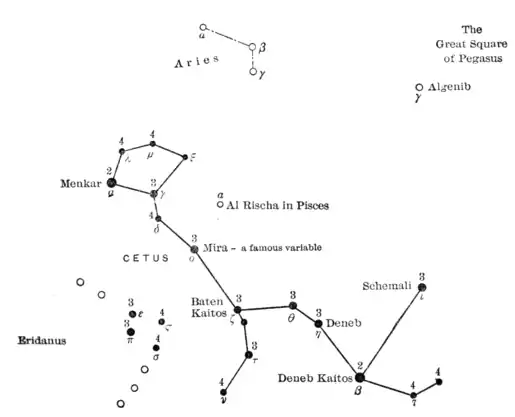CETUS (sē'-tus)— THE WHALE. (Face Southeast.)
Location.—A line drawn from Polaris, to (δ) Cassiopeiæ, and prolonged two and one third times its original length, reaches the centre of this constellation.
It lies just below Aries and the Triangles, and resembles the figure of the prehistoric icthyosaurus, while some see in the outline an easy chair. The head of the beast is characterized by a clearly traced pentagon, about 20 degrees southeast of Aries. The brightest star in the constellation is (α) Menkar, of the second magnitude. It is at one apex of the pentagon, about 15 degrees east of Al Rischa in Pisces, and 37 degrees directly south of Algol, (β. Persei).
The noted variable Mira (ο) is the chief object of interest in the constellation. It is a little over 10 degrees southwest of Menkar, and 7 degrees southeast of Al Rischa. It changes from a star of the second magnitude so as to become invisible once in three hundred and thirty-four days. Ten degrees south of it are four small stars about 3 degrees apart, in the breast and paws. These form a square.
The body of the creature is kite-shaped. (ζ) is a naked-eye double.
Mira lies almost exactly on a line joining (γ) and (ζ), a little nearer the former.
